Did you know that rhyming is one of the first steps toward phonemic awareness? This foundational skill is crucial in early childhood education, as it teaches children to recognize and play with the sounds within words. Rhyming helps kindergarteners develop an ear for language, making learning to read and write easier. By engaging with rhyming words for kindergarten kids, they begin to understand that words are made up of smaller sound units, a key aspect of phonemic awareness.
Math & ELA | PreK To Grade 5
Kids see fun.
You see real learning outcomes.
Watch your kids fall in love with math & reading through our scientifically designed curriculum.
Parents, try for free Teachers, use for free
This blog will discuss rhyming words, why they’re important, and how to teach them. We have a kindergarten rhyming words list and fun activities to learn rhyming words. This guide is great for teachers, parents, and anyone helping little ones learn.
Introduce your kindergartener to rhymes with these rhyme games:
What are Rhyming Words?
Rhyming words are words that have the same ending sound. Think of “dog” and “frog” or “sun” and “fun.” When you say them out loud, the end of these words sounds the same. Rhymes are great for learning because they show us how words can be similar by how they sound at the end. This helps kids listen closely to sounds, which is a big step in learning to read and write.
Three Stages of Rhyme Learning
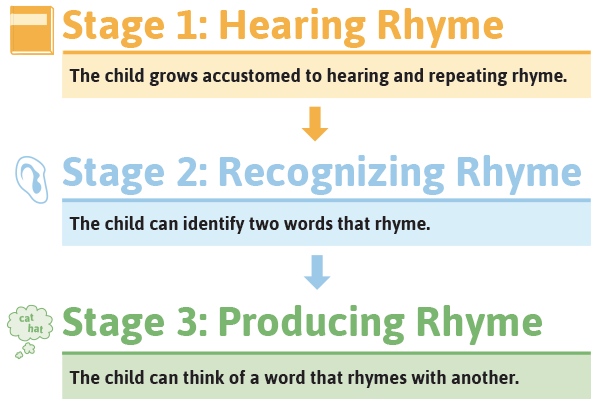
1. Sensitivity to Rhymes: Understanding the Concept of Rhyming Sounds
This is when kids start to notice that some words sound similar at the end. It’s like realizing “cat” and “bat” have the same “at” sound.
- When to start: You can start as early as when kids begin to talk and listen to stories.
- How to do it: Read books with rhymes or sing songs together. This introduces them to the rhythm and sounds of language.
- Key milestones: A big step is when a child smiles or laughs at rhymes, showing they understand the pattern.
Begin with these games where your kid can listen to rhyming words and play:
2. Recognition of Rhymes: Identifying Words that Rhyme Among a List of Words
Now, kids can pick out which words rhyme from a group. If you ask which word rhymes with “log” from “pig, frog, cat,” they can correctly say “frog.”
- When to start: This usually follows sensitivity to rhymes, often around preschool age.
- How to do it: Play simple games where you say three words and ask which two rhyme. Use English rhyming words to make it clear and fun.
- Key milestones: Being able to choose rhyming words from a list correctly shows they’re mastering this stage.
Begin here:
3. Production of Rhymes: Creating their pairs or lists of rhyming words
This is when kids can come up with their own rhyming words. If you say “hat,” they can say “cat,” “bat,” “rat,” and so on.
- When to start: After they’re good at recognizing rhymes, usually in kindergarten.
- How to do it: Encourage them to make up their rhymes, even silly ones. This is a fun part of learning rhyming words, where they get to be creative.
- Key milestones: A key achievement is when they can independently think of a list of words that rhyme with a word you give them.
Here are some printable rhyming worksheets to get you started:
By moving through these stages, from simply hearing rhymes in songs and stories to recognizing and making their own rhyming words, kids develop a strong foundation in phonemic awareness.
List of Rhyming Words for Kindergarten Kids
| WORD | Rhyme 1 | Rhyme 2 | Rhyme 3 | Rhyme 4 |
|---|---|---|---|---|
| Words That Rhyme With All | Ball | Call | Fall | Wall |
| Words That Rhyme With UP | Cup | Pup | Sup | Tup |
| Words That Rhyme With All | Ball | Call | Fall | Wall |
| Words That Rhyme With GO | Flow | Show | Slow | Throw |
| Words That Rhyme With IT | Bit | Fit | Hit | Sit |
| Words That Rhyme With AB | Cab | Jab | Lab | Stab |
| Words That Rhyme With AD | Bad | Glad | Pad | Sad |
| Words That Rhyme With DO | Boo | Shoe | Two | Zoo |
| Words That Rhyme With AT | Bat | Cat | Fat | Hat |
| Words That Rhyme With AG | Bag | Drag | Flag | Tag |
| Words That Rhyme With ON | Con | Dawn | Pawn | Yawn |
| Words That Rhyme With AN | Ban | Can | Fan | Pan |
| Words That Rhyme With OT | Bot | Dot | Hot | Lot |
| Words That Rhyme With BE | Free | Knee | Sea | Tree |
| Words That Rhyme With ME | Bee | Flee | Key | Plea |
| Words That Rhyme With SEE | Fee | Key | Lee | Pee |
| Words That Rhyme With DAY | Bay | Clay | Gray | Play |
| Words That Rhyme With NIGHT | Fight | Light | Right | Tight |
| Words That Rhyme With RED | Bed | Led | Shed | Wed |
| Words That Rhyme With BLUE | Clue | Flue | True | Due |
| Words That Rhyme With GREEN | Clean | Mean | Scene | Screen |
Related Reading: Best Nursery Rhymes That Are Fun
How Can You Use This List to Teach Rhyming Words
Here are some fun ways to use this list of rhyming words for kindergarten kids:
1. Fridge Magnets: Turn the rhyming word list into fridge magnets. Kids see them often and can play with creating rhymes while in the kitchen.
2. Rhyming Word Jar: Write each rhyming word on a slip of paper and put them in a jar. Have your child draw two at a time to see if they rhyme.
3. Flashcards: Create flashcards of the rhyming words. Use them for quick, fun games where kids match the rhyming pairs.
4. Rhyme Hunt: Hide rhyming word pairs around the house. Make it a game for kids to find and match them.
5. Story Time: Use the list to create stories together. Pick a word and start a story, encouraging your child to use a rhyming word from the list to continue.
6. Rhyming Bingo: Make a bingo game with the list. Each square has a word, and when you call out a word, they have to find a rhyming match.
7. Bedtime Rhymes: At bedtime, pick a word from the list and take turns coming up with rhymes until you fall asleep.
8. Rhyming Art: Draw pictures of items that rhyme and label them using the list. It’s a creative way to reinforce the words.
9. Daily Rhyme Time: Dedicate a time each day for rhyming. Pick a word from the list and see how many rhymes you can come up with together.
10. Rhyming Book: Create a book together where each page is dedicated to a word from the list and its rhymes, illustrated by your child.
Related Reading: Best Nursery Rhymes That Are Fun
7 Activities for Teaching Rhyming Words for Kids
1. Rhyming Word Online Games
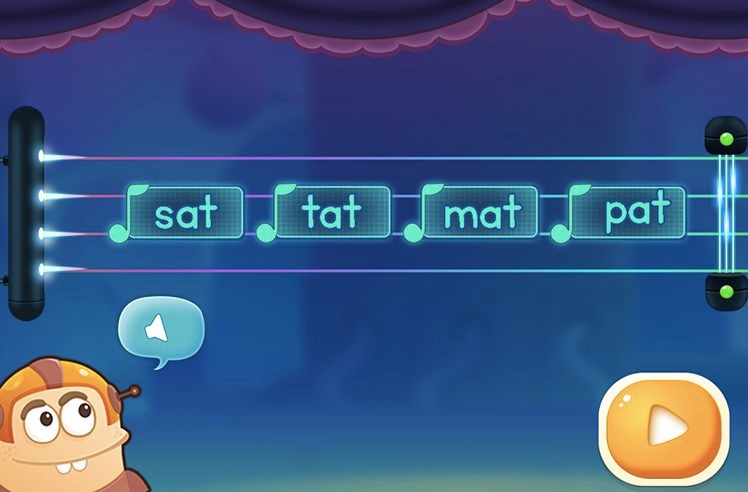
Online games are designed to teach children about rhyming words through interactive play. SplashLearn offers games where kids can complete rhymes. These games are great because they provide instant feedback and can be adjusted to different difficulty levels.
2. Rhyming Worksheets
Print worksheets that focus on rhyming words. These can include matching activities where kids draw lines between words that rhyme, fill-in-the-blank poems where they have to choose the correct rhyming word from a list, or crossword puzzles with clues that lead to rhyming words. Worksheets are great for individual practice and can help reinforce the concept of rhyming words through written activities.
3. Rhyming Word Pairs Memory Game
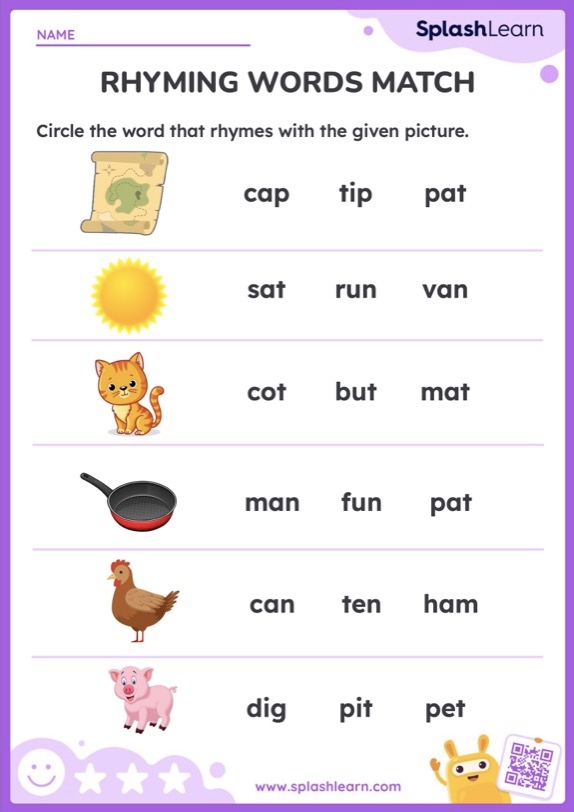
Create a set of cards with rhyming pairs (e.g., “cat” and “hat,” “dog” and “frog”). Lay the cards face down, and players take turns flipping two cards at a time to find matching rhymes. This game helps children recognize and remember rhyming words through repetition and visual memory.
4. Rhyme Fishing
Write rhyming words on paper fish and attach a paperclip to each. Make a fishing rod with a stick, string, and a magnet as the hook. Spread the fish out, and have kids ‘fish’ for words. Once they catch one, they have to find its rhyming pair from the pond. This activity is engaging and makes learning rhymes a hands-on experience.
5. Interactive Rhyming Stories
Choose a book with a strong rhyming pattern. Read the story aloud but pause before the rhyming word to let the child fill in the blank. This encourages active listening and helps them think of rhymes in context. Books like “The Cat in the Hat” by Dr. Seuss are perfect for this activity.
6. Rhyming Word Hopscotch
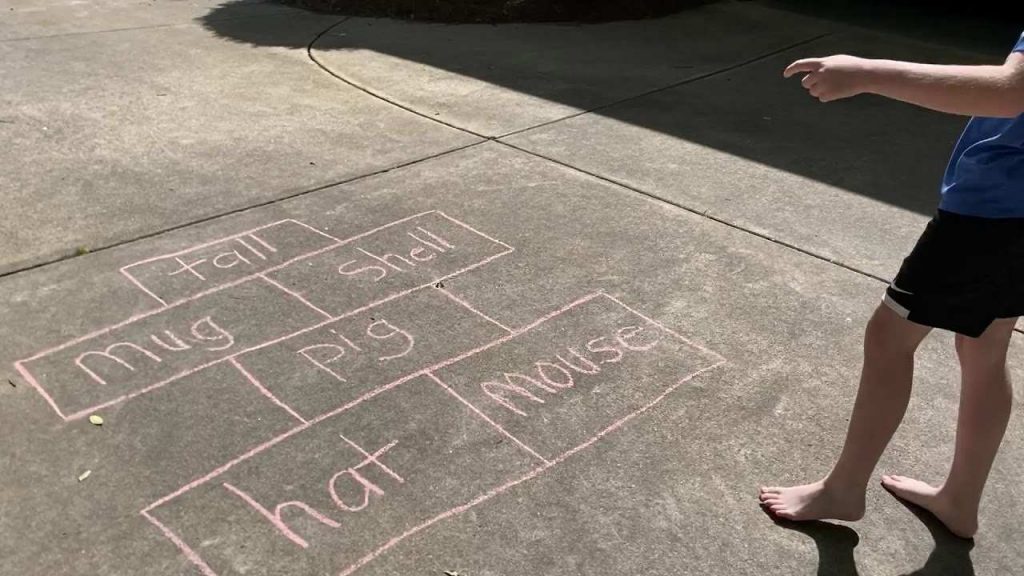
Draw a hopscotch grid on the ground and write a word in each square. As children hop on a square, they must say a word that rhymes with the one written. This activity combines physical activity with learning, making it a dynamic way to reinforce rhyming skills.
7. Rhyming Word Family Trees
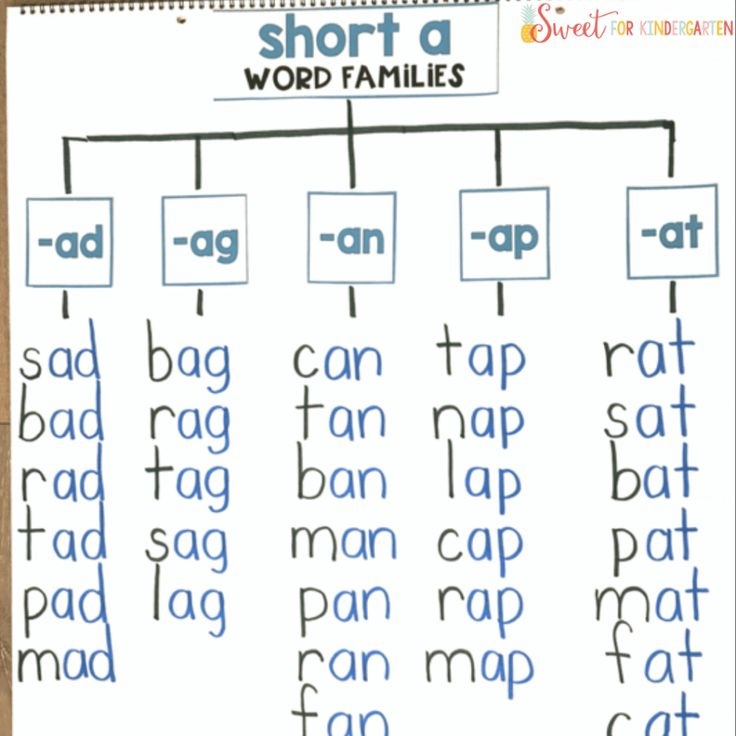
Create a “tree” on a large piece of paper or a bulletin board. Write a word ending (like “-at” or “-an”) on the trunk. Have children come up with words that rhyme with that ending and write each on a leaf, then attach the leaves to the branches. This visual activity helps kids understand word families and how many words can share the same rhyming sound.
Related Reading: Best Bulletin Board Ideas for an Attractive Classroom
Conclusion
Learning rhyming words for kindergarten is fun and important for them. It helps them with reading, speaking, and listening. We shared a list of rhyming words for kindergarten, activities, and ideas to make learning rhymes easy and enjoyable. Try these out to help your little ones play with words and sounds.
Related Reading: Easy Opposite Words for kids
Frequently Asked Questions (FAQs)
Do kindergarteners know how to rhyme?
Many kindergarteners start to understand and create rhymes, especially with practice and exposure through songs, stories, and playful activities.
What are rhymes in early childhood?
In early childhood, rhymes are simple, catchy words that sound similar, used to help children develop language skills and enjoy the rhythm of speech.
Should a 5 year old be able to rhyme?
Yes, most 5-year-olds can rhyme, as it’s a key language skill developed through listening to stories, singing songs, and engaging in rhyming activities.
At what age do children typically begin to rhyme?
Children typically begin to rhyme around ages 3 to 4, as they become more aware of sounds in language and enjoy playing with words.
How do you introduce rhymes to children?
Introduce rhymes to children through reading rhyming books, singing rhyming songs, and playing simple rhyming games that emphasize the sounds in words.


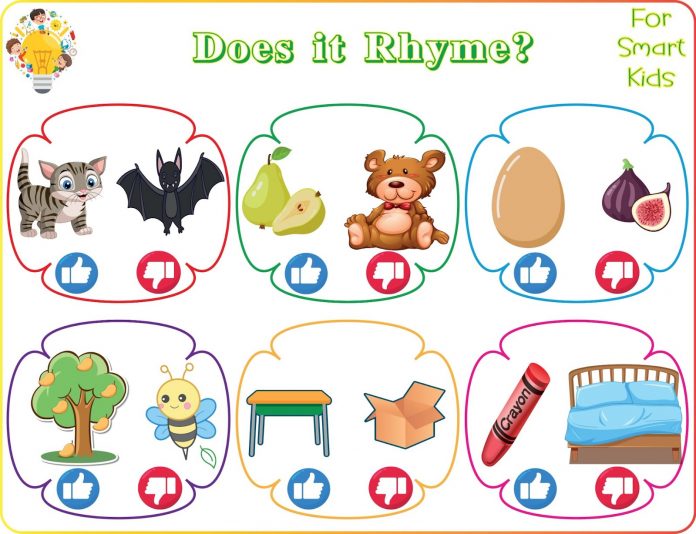



















![100 True or False Questions for Kids [With Answers] True or false for kids](https://www.splashlearn.com/blog/wp-content/uploads/2024/10/true-or-false-for-kids-100x70.jpg)


